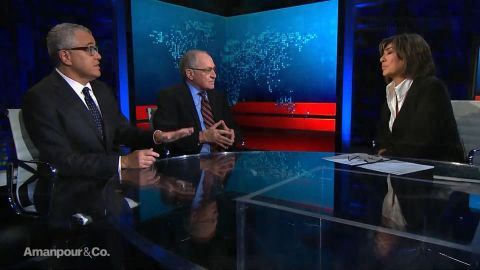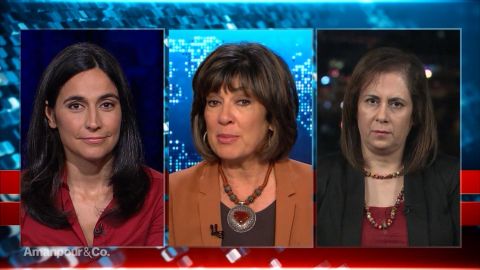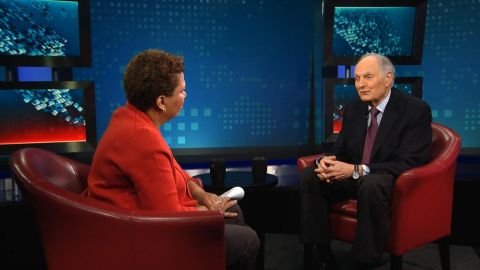Read Transcript EXPAND
MICHEL MARTIN: Alan Alda, thank you so much for joining us.
ALAN ALDA, ACTOR: Thank you.
MARTIN: Gosh, you’ve done so many things in your life. I mean the people, of course, know you for Hawkeye Pierce and appearing on “M-A-S-H,” which is
still, you now, one of the most watched — the final episode, one of the most watched TV episodes of all time. Many people may not know that you
also wrote many of the episodes.
But you have this whole other life as a student of communication, as a person who’s actively trying to help other people communicate better,
particularly in the scientific room but beyond that. So how did that desire to understand the roots of it start for you?
ALDA: It began in my roots as an actor because as an actor, you have to relate to the other person. I mean I learned that as time went on. In the
beginning, it was performing, it was doing something to amaze an audience and get them to pay attention to you and like you. And then I began to
realize it doesn’t really happen. They don’t really get engaged with what’s going on, unless you’re engaged with the other performer.
And you mentioned “M-A-S-H.” When we were on “M-A-S-H,” we would sit around in a circle and talk and laugh and make fun of each other and we got
such a connection as regular people. And when we went on the set, a couple minutes later, we still had that connection. I helped start the Center for
Communicating Science at Stony Brook University because I thought if we teach scientists to make this connection, then whether they’re talking to a
live audience or writing for them, they’ll be aware of the audience as they’re the other player in the conversation.
And that to me, is the basis of communication, is what’s going on in your head, not what’s going on in my head so much.
MARTIN: One of the things that I found intriguing about the center at Stony Brook University is that you used some of the techniques you learned
as an actor to help scientists to communicate better. Will you talk a little bit about that?
ALDA: We teach them improvisation exercises. A lot of people think improvisation is comedy improvisation but that’s not what we teach. We
teach exercises that were embedded first maybe 70 years ago by Viola Spolin who was the mother of Paul Sales who started second city.
So it became eventually comedy but it’s not really — that’s not why we teach it. We teach it to establish a connection. And all the exercises
that we do are to maintain that connection with the person you’re playing with in the games. And then when you turn to an audience, you make that
same connection with them.
MARTIN: This is obviously a passion project for you. But was there something in particular that sparked your hunger to help people communicate
better?
ALDA: I don’t know if there was. It was kind of a rolling discovery. I never expected I’d be teaching communication, writing a book about it.
There were 30 people at the Center for Communicating Science who were teaching all over the United States and in five other countries around the
world. I never expected that but I realized that I had something to offer. And to me, that’s the best feeling.
MARTIN: Your podcast, you’ve got a called Clear and Vivid that you just started this summer. I understand that it grew out of your work, with your
foundation, with the work that you’re doing on helping scientists to communicate better. Tell me about what is the goal other than it’s hip to
have a podcast these days. I know you want to be hip.
ALDA: I know. There’s a wonderful cartoon from the New York that it says — two people talking, one says, “I’m thinking of stopping a podcast.”
It’s about this whole subject we’ve been talking about. The podcast Clear and Vivid is about relating to other people and communicating. And
although it grew out of trying to teach scientists to communicate better, one of the things we found out from the scientists themselves was that it
was applying to everybody, not just scientists.
At least one scientist said, “You know, this training is saving my marriage.” Because if you listen better and communicate better, things go a
lot more smoothly. So we found there’s almost an endless supply of people, interesting people to talk to, some famous, some not so famous, about
relating and communicating in so many different ways.
For instance, the most striking example to me is talking to, on the program, talking to a hostage negotiator who said, “You know, these same
techniques I use to get a hostage released is very good in a marriage between spouses.” It has to do with listening. Over and over, they talk
about the importance of empathy.
MARTIN: One of the things that a lot of people have talked about on the current political moment is that people don’t want to talk to people who
don’t already agree with them.
ALDA: Yes, that’s true. But we’re — I’m talking to people. Look, I talked with Lady Paul Grugen (ph) who has taken groups of women from
Israel, who has groups of women together, who has groups of women from Palestine and they have gone places together and shared experiences and
learned from one another. I talked with George Mitchell who brought peace in Northern Ireland and in both cases they did it by introducing people to
other people who they hated.
MARTIN: I actually have a clip. Do you want to play it? I can play a clip from George Mitchell.
(BEGIN VIDEO CLIP)
SEN. GEORGE MITCHELL, (D) TEXAS: I said listen, we’re going to be here. We don’t know how long but these are long days and nights. We’re going to
eat our meals together. And what I’m asking you is during the meals, don’t talk about business. They said, “Well, what are we going to talk about?”
I said we’ll talk about your kids, talk about your wives, talk about your dogs, talk about your vacations. What do human beings talk about when
they’re not involved in negotiations or trying to end a war? It was awkward at first but then it kind of worked.
(END VIDEO CLIP)
ALDA: And it’s over and over again. The funny thing is, it doesn’t just work with people you hate. It works with people you love.
MARTIN: Let’s talk about people you hate, though. I mean because I’ve been listening to our conversation so far and I’m thinking I can see easily
where this works in your family circles or in community.
ALDA: We are in a time of tremendous polarization. And just as in George Mitchell’s clip, if all we do is stick to talking about things that divide
us, what he called the business, when they sat down at dinner they couldn’t talk about business, they had to talk about their children, their dogs,
things where they had an emotional attachment to them. They had an everyday human experience that they could share with the other person as a
fellow human.
Maybe that’s a clue for family dinners. Maybe it’s a clue for members of Congress. Maybe it’s too soon to ask them to go back out and have a beer
together after work. But to stop in the hallway for a minute and talk about something that has nothing to do with business but just who are we as
people, it actually will help us talk to one another regardless of the position we take. You don’t have to change the world. You just have to
respect the other person as a person.
MARTIN: I want to play a clip from a conversation you had with Sarah Silverman, the comedian. She’s got a program where she’s going out and
trying to connect with people who she doesn’t necessarily agree with. But one of the things you talked about in your conversation with her was an
exchange she had with a troll. For people who aren’t familiar with that term, somebody who connects with you or reaches out to you on social media
for the purpose of being mean.
(BEGIN VIDEO CLIP)
SARAH SILVERMAN, COMEDIAN: I happened to see somebody, she just called me the C-word.
ALDA: And just that one word that was the whole tweet.
SILVERMAN: Yes, simple.
ALDA: Yes.
SILVERMAN: I saw his tweets and they were so filled with rage but not about anything in particular, just rage. And them among them was a tweet
about his severe back pain and I saw that he was just in pain which is a lot — most of — maybe all of rage comes from pain, you know, physical or
emotional. And so I just tweeted a loving gesture towards him.
ALDA: Do you remember what you said? I remember something like you must have been terribly hurt at some point in your life. Did you say that?
SILVERMAN: Yes. Just something like this is rage that is thinly, very thinly masked pain and my heart breaks for you. But he immediately opened
up. I mean I think he didn’t have people in his life that were concerned.
(END VIDEO CLIP)
MARTIN: There’s a lot there, isn’t there?
ALDA: You know what she end up doing is he said, “I can’t show any love that was ripped out of me by an abuser when I was a child.” And she helped
him find a place where you get therapy for free, therapy for people who had suffered that same kind of abuse. And I interviewed her in her kitchen,
and she told me, “Oh, just an hour ago I was communicating with this guy again.” They’re friends now. I think she took a real risk doing that. I
think it shows real courage, but look what you can get if you’re lucky and you have that kind of courage.
MARTIN: You’ve obviously chosen the people you spoke with, with intention, and because you want to us to learn from something. And I’m trying to
figure out now, let’s say going back to Charlottesville, Virginia, and the demonstration there and these hundreds of guys, mostly men, with these
torches marching around saying, “Jews will not replace us.”
And you can see people looking at that and thinking, “I’m afraid of these people. They don’t want me to exist. They don’t want my children to exist
or they only want me to exist in a subservient place in their lives. They don’t want to understand me. They just want to rule me.”
ALDA: Right. It doesn’t seem possible. We’re not going to meet each other halfway because they don’t want us to exist. But just yesterday, I
interviewed Christian Picciolini who was a skinhead for about five years, beat people up mercilessly, believed in the philosophy of those people
marching in Charlottesville.
He had a flash of empathy a couple of times and realized that the people he was beating up were fellow humans and he didn’t want to do it anymore.
Little by little he got himself out of the movement and then has spent the rest of his life helping other people get out of the Neo-Nazi movement. He
has helped 200 people get out but you don’t collect 200 people in a room and talk to them. It’s a person-to-person experience.
MARTIN: And what’s your message to the people who feel afraid of people like him? What would you say they should do?
ALDA: Well, I think we have to be cautious about those people. I think that whole movement, and it’s in the hundreds of thousands when you look
worldwide. It’s a very dangerous movement. We fought a war over that. But before we fight the war, again, people like Christian Picciolini can
make a concerted effort. He has a whole organization that works on this one by one, person-to-person, to find out how you can bring them to human
awareness and then introduce them to the people they think they hate.
MARTIN: What’s your suggestion for how we should practice that? Like I walk out of here today, what should I do?
ALDA: Well, what I do — you have to do what you want to do, but what I do is I try to figure out what people are going through. I happened to have a
brain problem called prosopagnosia which is face blindness, so I don’t remember faces. But therefore, it’s interesting to be the study of face
and try to really see the person I’m talking to.
And the more I do that, I think the better able I am to know what they’re going through. And the more I know what they’re going through, therefore
the more empathy I have. And therefore maybe, if I really want to, I can be more compassionate but you have to want to. I don’t think empathy makes
you compassionate.
I found, and I think I see it in other people, that when you are more empathic, you not only know more about the other person, but you’re more
available to things that come up from the back of your head, yourself. You’re more aware of your own emotions, your own creative thoughts. I
don’t know why that should be but I find it I’m more in touch with myself and not just with the other person.
MARTIN: I noticed that you share a lot about your life and have over the years. I know you shared about growing up with a mom who was struggling
with mental illness and therefore the whole family was. And I noticed that you shared even now that Parkinson’s is something that you’re living with.
And I wondered as a person who is so well-known, I was thinking about this that social media kind of allows us all to do what celebrities have had to
do which is to be known in some way. On the other hand, sometimes it feels like a trap. Like I don’t necessarily want people to know these things
about myself. How do you handle that?
ALDA: Yes, I think there’s a difference. There’s a distinction to be made. And the distinction between personal and private I think is good. I
didn’t mention to anybody I had Parkinson’s for three and a half years and then I realized people were going to notice that I had a tremor. When the
first story came out about it, I wanted to make sure that it wasn’t the sob story, it wasn’t maudlin.
Because one of the problems that I think that people who get diagnosed with it have is that there’s the tendency on the part of the whole culture to
think the world has come to an end with that diagnosis but it hasn’t. And as a matter of fact, that feeling, that worry that the world has come to an
end and you have to keep it a secret even from yourself and just hope it goes away, you might postpone doing something that can help like an
exercise program and that can hold off worse symptoms for a long time.
I wanted to help get rid of the stigma but I don’t want it to be my identity.
MARTIN: I was going to ask exactly. Yes. You don’t want to be the poster child.
ALDA: Exactly.
MARTIN: Right.
ALDA: So I don’t talk about it. I have to talk about it if somebody asks me.
MARTIN: I cannot help but notice that you and your wife have been married for a long time.
ALDA: Sixty-one years.
MARTIN: Sixty-one years. And congratulations.
ALDA: Yes. Thank you.
MARTIN: I have to give you congratulations and my admiration for that because it is an achievement.
ALDA: It wasn’t that hard, believe me.
MARTIN: Well, see, that shows you’ve been married for a long time. I wonder if your study of communication is something that you attribute in
part the longevity to that. Is it part of your —
ALDA: Well, it gets better and easier the more I think I learn about communication. Arlene’s always been great at it. There may be two of most
male/female relationships but I think the basis of this is really that we really do love each other.
So when people say, “What’s the secret?” I say well we really love each other. Have you tried that? But she has a whole other take on our long
marriage. Arlene says the secret to a long marriage is a short memory. So maybe I benefited from that.
MARTIN: Alan Alda, thank you so much for talking with me.
ALDA: Thank you. You didn’t look at those pages. I loved that. It’s so nice.
MARTIN: Well, thank you.
About This Episode EXPAND
Christiane Amanpour interviews Jeffrey Toobin, Staff Writer at the New Yorker and legal analyst Alan Dershowitz, Harvard Law Professor and civil liberties lawyer; and Julia Bacha, filmmaker & Rula Salameh, activist in the First Intifada. Michel Martin interviews Alan Alda, actor.
LEARN MORE


